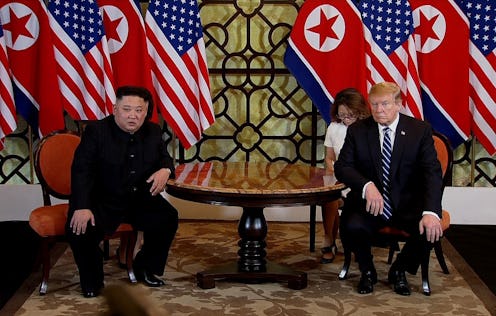News
This Is What Trump Said About Otto Warmbier’s Death After His Talks With Kim Jong Un

The 22-year-old American who died in June 2017 after being released from a Pyongyang prison put a human face to the escalating tensions between the United States and North Korea two years ago. President Donald Trump often references him when discussing relations between the two countries. But when Otto Warmbier's death came up at the Hanoi summit on Thursday, Trump spoke more generously of the Democratic People's Republic of Korea (DPRK) than he once did when discussing the young man.
"He felt badly about it. He felt very badly," Trump told reporters, referring to Kim Jong Un's reaction to the tragedy. The president also suggested that Kim didn't realize Warmbier had been mistreated while in prison. "He tells me that he didn't know about it and I will take him at his word," Trump said.
Trump used a markedly different tone in the immediate aftermath of Warmbier's death. At that time, he seemed to blame the North Korean government. "The United States once again condemns the brutality of the North Korean regime as we mourn its latest victim," he announced.
Warmbier's parents also put responsibility on the DPRK government — they even sued the regime for $500 million in damages last year. In a statement published at the time of the lawsuit, Fred Warmbier argued that his son had been "singled out for exceptionally harsh and brutal treatment by Kim Jong-un."
South Korea puts blame on the North Korean regime, too. President Moon Jae In has stopped short of saying that Kim murdered the young man by commenting that "we cannot know for sure." But because Warmbier was in the official custody of the DPRK, Moon argues that the government has "a heavy responsibility."
Exactly what happened to Warmbier while he was imprisoned, as well as who caused his injuries, remains a mystery. But it's certainly true that the North Korean government maintains a tight hold over all of the country's institutions, including its prison system. The United Nations published a 2017 report arguing that the regime uses jails as a means of social control, that Kim has ultimate responsibility for that system, and that he should be prosecuted for crimes against humanity. A U.N. worker who was imprisoned in Auschwitz as a child stated that he believes North Korean prisons are as bad, if not worse, than Holocaust concentration camps.
Despite all of this, Trump seemed to give Kim some leniency. "I don't think that the top leadership knew," he said on Thursday. Explicitly referring to Kim, Trump added: "I don't believe that he would have allowed that to happen. It just wasn't to his advantage to allow that to happen."
"He knew the case very well," Trump continued. "But he knew it later... In those prisons and those camps, you have a lot of people."
Warmbier was a more notable prisoner than most; he was one of just four U.S. citizens held captive in North Korea at the time of his release. But Trump is now standing firm in his defense of Kim, "I really don't think it was in his interests at all," Trump said.